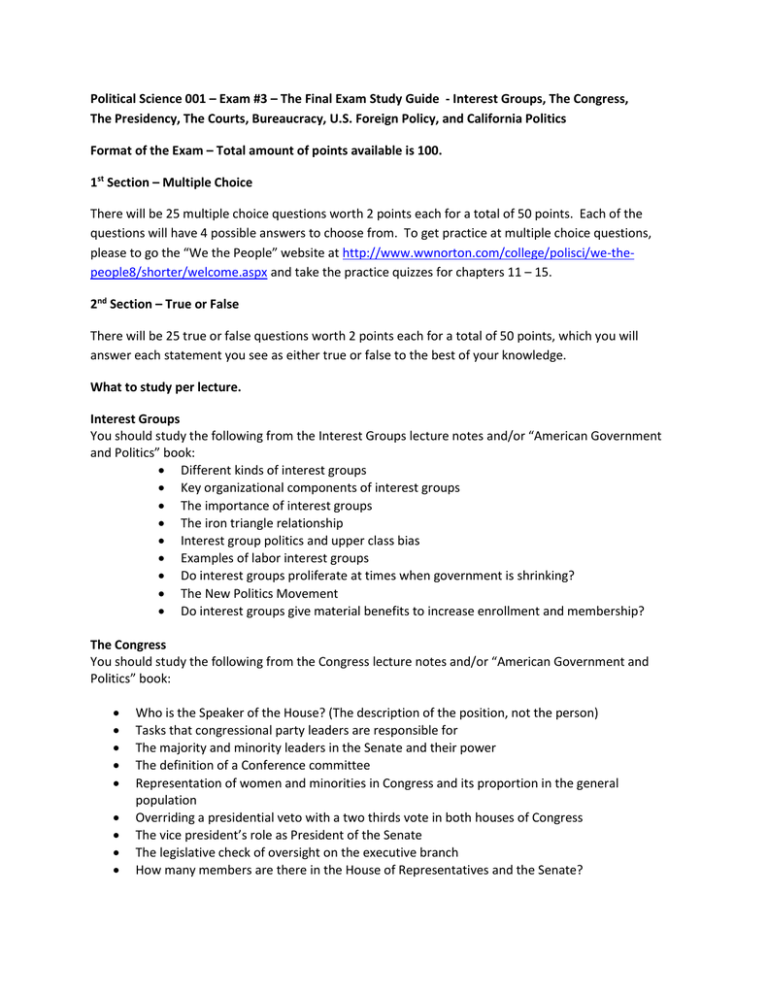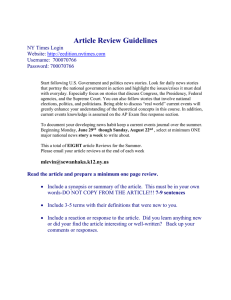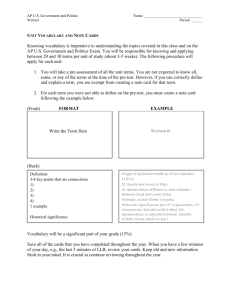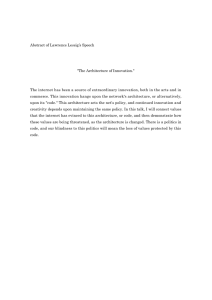Final Exam Study Guide.doc
advertisement

Political Science 001 – Exam #3 – The Final Exam Study Guide - Interest Groups, The Congress, The Presidency, The Courts, Bureaucracy, U.S. Foreign Policy, and California Politics Format of the Exam – Total amount of points available is 100. 1st Section – Multiple Choice There will be 25 multiple choice questions worth 2 points each for a total of 50 points. Each of the questions will have 4 possible answers to choose from. To get practice at multiple choice questions, please to go the “We the People” website at http://www.wwnorton.com/college/polisci/we-thepeople8/shorter/welcome.aspx and take the practice quizzes for chapters 11 – 15. 2nd Section – True or False There will be 25 true or false questions worth 2 points each for a total of 50 points, which you will answer each statement you see as either true or false to the best of your knowledge. What to study per lecture. Interest Groups You should study the following from the Interest Groups lecture notes and/or “American Government and Politics” book: Different kinds of interest groups Key organizational components of interest groups The importance of interest groups The iron triangle relationship Interest group politics and upper class bias Examples of labor interest groups Do interest groups proliferate at times when government is shrinking? The New Politics Movement Do interest groups give material benefits to increase enrollment and membership? The Congress You should study the following from the Congress lecture notes and/or “American Government and Politics” book: Who is the Speaker of the House? (The description of the position, not the person) Tasks that congressional party leaders are responsible for The majority and minority leaders in the Senate and their power The definition of a Conference committee Representation of women and minorities in Congress and its proportion in the general population Overriding a presidential veto with a two thirds vote in both houses of Congress The vice president’s role as President of the Senate The legislative check of oversight on the executive branch How many members are there in the House of Representatives and the Senate? The Presidency You should study the following from the Presidency lecture notes and/or “American Government and Politics” book: The president’s position as head of state as defined in the Constitution in military, judicial, and diplomatic powers The War Powers Resolution Why is the president’s State of the Union Address important? What is required for Congress to override a presidential veto The War Powers Resolution: has it been obeyed closely by most presidents over the past thirty years? The State of the Union address: Is it mandated by the Constitution Does the vice president break tie votes in the Senate? The Founding Fathers and their concern of a directly elected president would be too powerful Was George W. Bush was the 1st president to use signing statements? The Courts You should study the following from the Courts lecture notes and/or “American Government and Politics” book: How jurisdiction for each federal court is derived What is original jurisdiction? How many justices are there on the Supreme Court? The Supreme Court and Article III of the U.S. Constitution The federal appellate court system The process of judicial confirmations in the U.S. Senate The Bureaucracy You should study the following from the Bureaucracy lecture notes and/or the “American Government and Politics” book. What are the major roles of bureaucracies? What is the origin of most federal bureaus? The Federal Reserve and its power to set interest rates and regulate lending activities for the banks. Has the ratio of federal employees to the total U.S. work force gone up in the last half century? Was the Department of Homeland Security created in response to the 9/11 attacks? The U.S. Mint and the responsibility of printing U.S. currency. U.S. Foreign Policy You should study the following from the U.S. Foreign Policy lecture notes and/or the “American Government and Politics” book. The policy of deterrence and the arms race during the Cold War What is the policy of preemption? The Presidency and its importance to establishing U.S. foreign policy The U.S. Senate and its power in reviewing and approving foreign treaties The Cold War and the policy of deterrence in U.S. foreign policy Is promoting human rights a primary priority of U.S. foreign policy? Is the creation of a better world one of the three main goals of U.S. foreign policy? What is the most important institution in formulating and executing U.S. foreign policy? California Politics You should study the following from the California Politics lecture notes. What is an initiative? What is a referendum? What is a recall?





